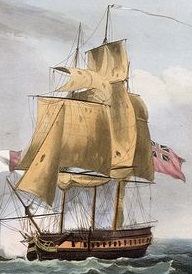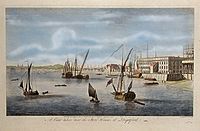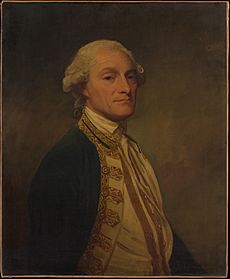HMS Aquilon (1758) facts for kids

Aquilon was built to the same design as HMS Carysfort, (pictured)
|
|
Quick facts for kids History |
|
|---|---|
| Name | HMS Aquilon |
| Ordered | 6 May 1757 |
| Builder | Robert Inwood, Rotherhithe |
| Laid down | 15 June 1757 |
| Launched | 24 May 1758 |
| Completed | 30 June 1758 at Deptford Dockyard |
| Commissioned | January 1758 |
| In service |
|
| Fate | Sold at Deptford 29 November 1776 |
| General characteristics | |
| Class and type | 28-gun Coventry-class sixth-rate frigate |
| Tons burthen | 599 8⁄94 bm |
| Length |
|
| Beam | 33 ft 10.25 in (10.3 m) |
| Depth of hold | 10 ft 6 in (3.20 m) |
| Sail plan | Full-rigged ship |
| Complement | 200 |
| Armament |
|
HMS Aquilon was a fast warship called a frigate. It had 28 guns and was part of the British Royal Navy. The ship was built in 1758.
Aquilon was very active during the Seven Years' War against France. It captured many enemy ships. In just eight months of 1761, it took seven French vessels! The ship was later sold in 1776.
Contents
Building a Warship: HMS Aquilon
Aquilon was a "sixth-rate" ship. This meant it was a smaller warship, but still very powerful. It was made mostly of oak wood. It was one of 18 ships in its class, called the Coventry-class frigates.
These ships were designed like another successful warship, HMS Tartar. That ship had captured five French privateer ships in its first year!
The Royal Navy hired Robert Inwood to build Aquilon. He was a shipbuilder in Rotherhithe. Work started on June 15, 1757. The ship was finished on May 24, 1758.
Ship's Size and Weapons
Aquilon was about 118 ft 17.5 in (36.4 m) long. It was 33 ft 10 in (10.31 m) wide.
It carried 28 guns:
- 24 large cannons (called nine-pounders) on its main deck. These fired 9-pound cannonballs.
- 4 smaller cannons (three-pounders) on the quarterdeck.
- 12 very small swivel guns along its sides.
The ship needed a crew of 200 sailors and officers to operate it.
Aquilon's Time at Sea
Fighting in Europe
Aquilon joined the Royal Navy in May 1758. This was during the Seven Years' War against France and Spain. Its first captain was Chaloner Ogle.
After getting its crew and supplies, Aquilon sailed in June. It spent a year patrolling an area called The Downs. Later, it joined a fleet in the English Channel. This fleet was led by Admiral George Rodney. Their job was to attack enemy ships and capture "privateers." Privateers were private ships allowed to attack enemy merchant ships.
Aquilon quickly proved its worth. In its first eight months, it captured six French ships!
- On January 12, it captured a 10-gun privateer called La Marie-Therese.
- The next day, it seized another ship, La Royal Cantabre.
Both ships were taken to Cork, Ireland.
Chasing a Privateer
On January 30, Aquilon was near Portugal. Its crew saw three ships. Two of them quickly sailed away. The third ship came closer, looking like it wanted to fight. It was a 20-gun French privateer named Le Comte de Gramont.
When the French ship realized Aquilon was a British warship, it tried to escape! Aquilon chased it and caught up the next day. The French ship, with fewer guns, surrendered without a fight. Its 117 crew members were taken prisoner. The ship and its cargo were sent to Lisbon.
More Victories
Aquilon continued to capture more ships:
- On March 4, it captured Le Zephyr (12 guns) near Ushant.
- On April 13, it took La Poste (10 guns).
- In July, it seized L'Aurore (10 guns) near Spain.
- On August 7, Aquilon captured La Subtile near Cape Finisterre. This was a 16-gun French ship carrying goods from the East Indies. Its 84 crew members were taken prisoner.
Escaping a Big French Warship
Later in August 1761, Aquilon was on patrol alone. It suddenly met a very large French warship with 74 guns! Aquilon tried to escape. Both ships became stuck because there was no wind.
Captain Ogle ordered his crew into small boats. They rowed ahead of Aquilon and towed the ship to pull it away. The French crew did the same thing. After 26 hours of rowing, Aquilon had moved far enough away. The French ship gave up the chase.
| Date | Ship | Type | Guns | Crew | Home port |
|---|---|---|---|---|---|
| 12 January | La Marie Therese | privateer | 10 | 75 | unknown |
| 13 January | Le Royal Cantabre | privateer | unknown | Less than 75 | unknown |
| 31 January | Le Comte de Gramont | privateer | 20 | 117 | Bayonne |
| 4 March | Le Zephyr | privateer | 12 | 114 | Bayonne |
| 13 April | La Poste | unknown | unknown | unknown | unknown |
| July | L' Aurore | privateer | 10 | 75 | La Rochelle |
| 7 August | La Subtile | East Indiaman | 16 | 84 | Mauritius |
Service in the Caribbean
After its victories in Europe, Aquilon was sent to the Caribbean. It was part of Admiral Rodney's fleet. This fleet was going to invade Martinique, a French island. The fleet had 17 large warships and more than 25,000 British soldiers.
Aquilon sailed to the Caribbean on December 19, 1761. On January 28, it recaptured a British merchant ship called Portland. This ship had been taken by the French. Martinique fell to the British on February 4.
Aquilon stayed near the Leeward Islands. It did not play a big role in the last year of the war. Peace was declared in March 1763 with the Treaty of Paris.
End of Service
Captain Chaloner Ogle left Aquilon in July 1763. The ship was no longer needed by the Navy. After a short trip to Newfoundland, it returned to Chatham Dockyard. There, its crew was "paid off" (meaning they left the ship to join other vessels).
Aquilon was repaired starting in December 1764. This took six months and cost a lot of money. In April, it was ready for service again. Captain Richard Onslow took command.
The ship served in the Mediterranean Sea for three years. In July 1769, it was taken out of service again. It was sent to Deptford Dockyard to be sold.
After seven years at Deptford, Aquilon was sold on November 29, 1776. It was sold for £725.
 | Precious Adams |
 | Lauren Anderson |
 | Janet Collins |



